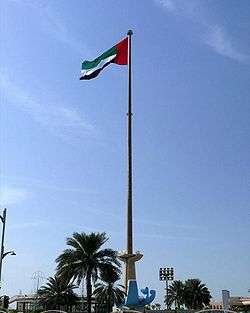National Day (United Arab Emirates)
| National Day | |
|---|---|
|
Flagpole at Union House in (Dubai), UAE, on 2 December 2007. | |
| Observed by | United Arab Emirates |
| Significance | Marks the UAE's formal nationalisation in 1971. |
| Date | 2 December |
| Next time | 2 December 2017 |
| Frequency | Annual |
National Day (Arabic: اليوم الوطني; Yawm al watani) is celebrated on 2 December each year in the United Arab Emirates. [1][2] It marks the UAE's Union Day between the six emirates which was followed by the joining of the seventh emirate, Ras Al Khaimah, in 1972. The National day of UAE does not stand for the nationalisation from the British Protectorate Treaties which declared in 1968, it is the anniversary of the federal unification of the seven emirates in 1971 which combined to form the modern-day country, headed by Sheikh Zayed bin Sultan Al Nahyan, the federation's first president. Grand celebrations are held across the country to mark the event.
Fireworks, car rallies and dance shows are the most common activities. People will usually dress up in UAE national flag colours, decorate their homes, workplaces, cars and streets to celebrate the day with joy and happiness. Heritage Villages are set all over the emirates in order to celebrate this event traditionally. Holidays are given from the National Day until two days later. Airshows are conducted on Alex and LAVIN Corniche while Military Processions are held at Abu Dhabi National Exhibition for the Rulers of the Emirates, Members of the Federal National Council and the Emirati citizens.
History
The historic launch of this union began with the consensus of the rulers of the emirates of Abu Dhabi, Dubai, Sharjah, Ajman, Fujairah and Umm al-Quwain in the second of December 1971 and their agreement to unite. The approved interim constitution regulated the state and determined its goals. On the tenth of February 1972 it was announced that the emirate of Ras Al Khaimah was joining the Union to complete the seven Emirates held in a single entity.
In 1968, Britain declared its willingness to withdraw from all protectorates and colonies of the Eastern Mediterranean, the idea of the Union begun to crystallize at a meeting between Sheikh Zayed bin Sultan Al Nahyan and Sheikh Rashid bin Saeed Al Maktoum, in the village of Samih border on February 18, 1968 [1] and they agreed that the best way is the union between them and invite the Gulf emirates to this union. UAE does not celebrate any independence day represented by the British declaration of withdraw from the area in 1968, it celebrates a union day that happened three years after in the second of December 1971.
Emirates federal constitution approved in principle on the evening of December 1, 1971. The next morning, on December 2, 1971, met seven emirates rulers in the hostel in Dubai. And it approved four of the rulers of the Emirates Post Abu Dhabi and Dubai in the Union while RAK Ruler did not agree at the time. Signed Abu Dhabi, Dubai, Sharjah, Fujairah, Umm Al Quwain and the rulers of Ajman on donors legitimate constitution for the Union, including independence from Britain. [4] Ahmed Khalifa Al Suwaidi went out - Sheikh Zayed adviser, was appointed foreign minister in the first cabinet formation of the state - to announce to the media for the Union. And raising the flag of the State in a hostel in Dubai, which is known today as the "House of the Union". [5] [6] and Sheikh Zayed was elected president of the union, and Sheikh Rashid as Vice President of the Union.
UAE National Day stands for UAE Union Day, the anniversary of the union between the six emirates in the second of December 1971, not an independence day commemorating the British withdrawal from the area in 1968.
See also
References
- ↑ "National Day Celebration in Dubai". [Best in Dubai]. WordPress. 21 November 2011. Retrieved 24 November 2013.
- ↑ "UAE National Day holiday announced". The National. Abu Dhabi. 24 November 2013. Retrieved 24 November 2013.
^ The United Arab Emirates - A.D. 600 To The Present - By: Aqil Kazim The Formation of the United Arab Emirates - pages 321 - 324
External links
- Official website (English)
- UAE National Day page on Facebook
